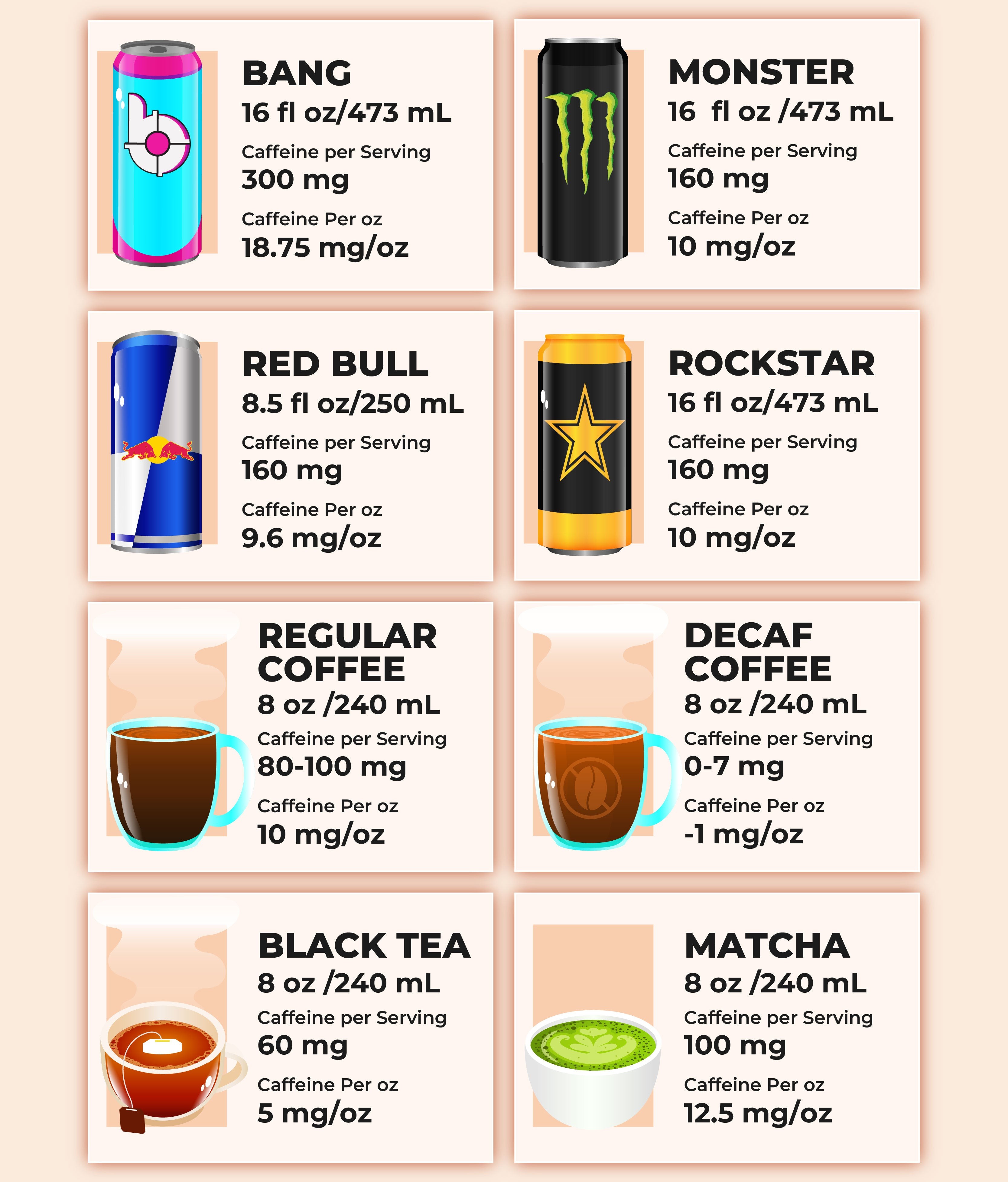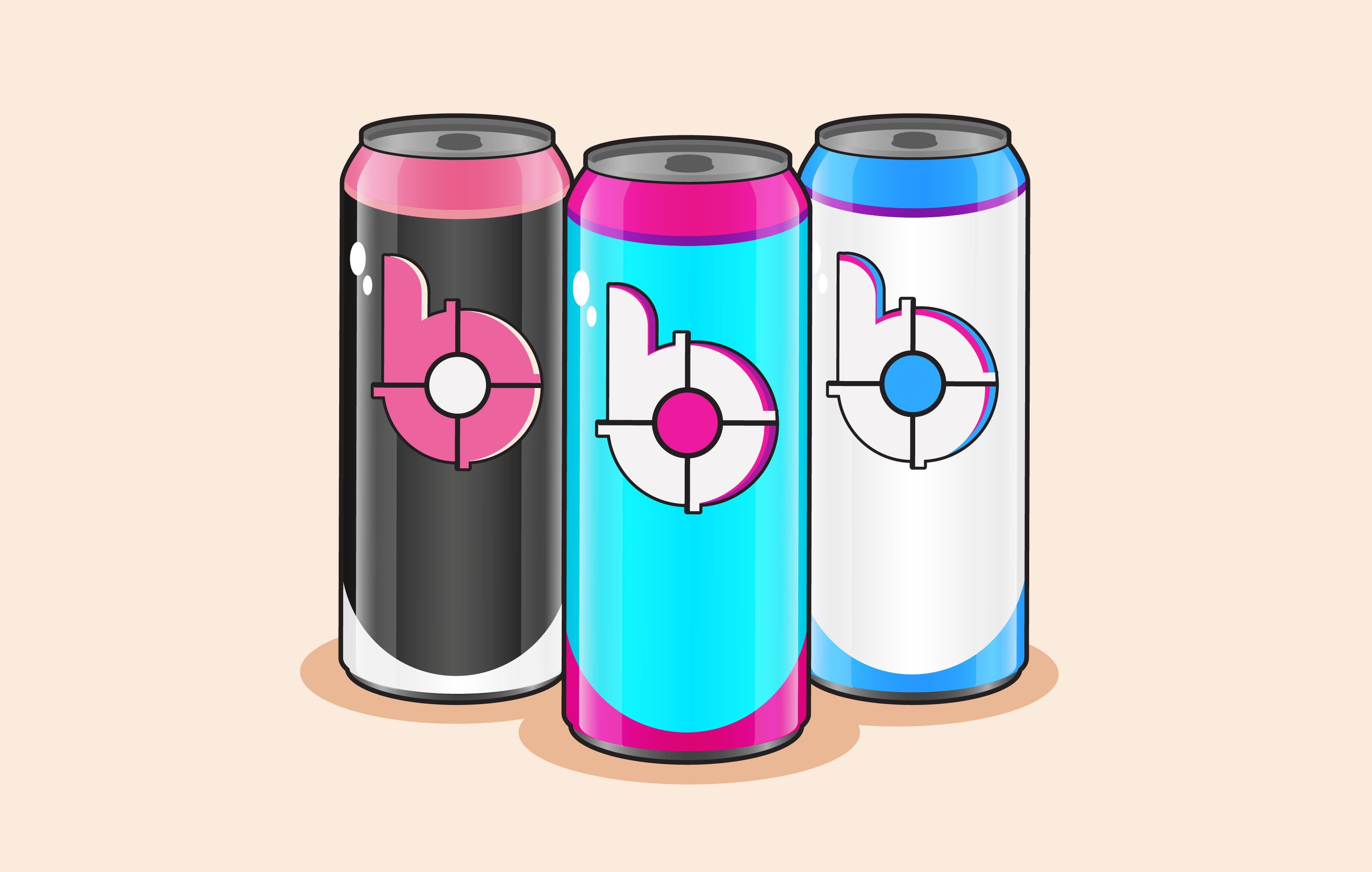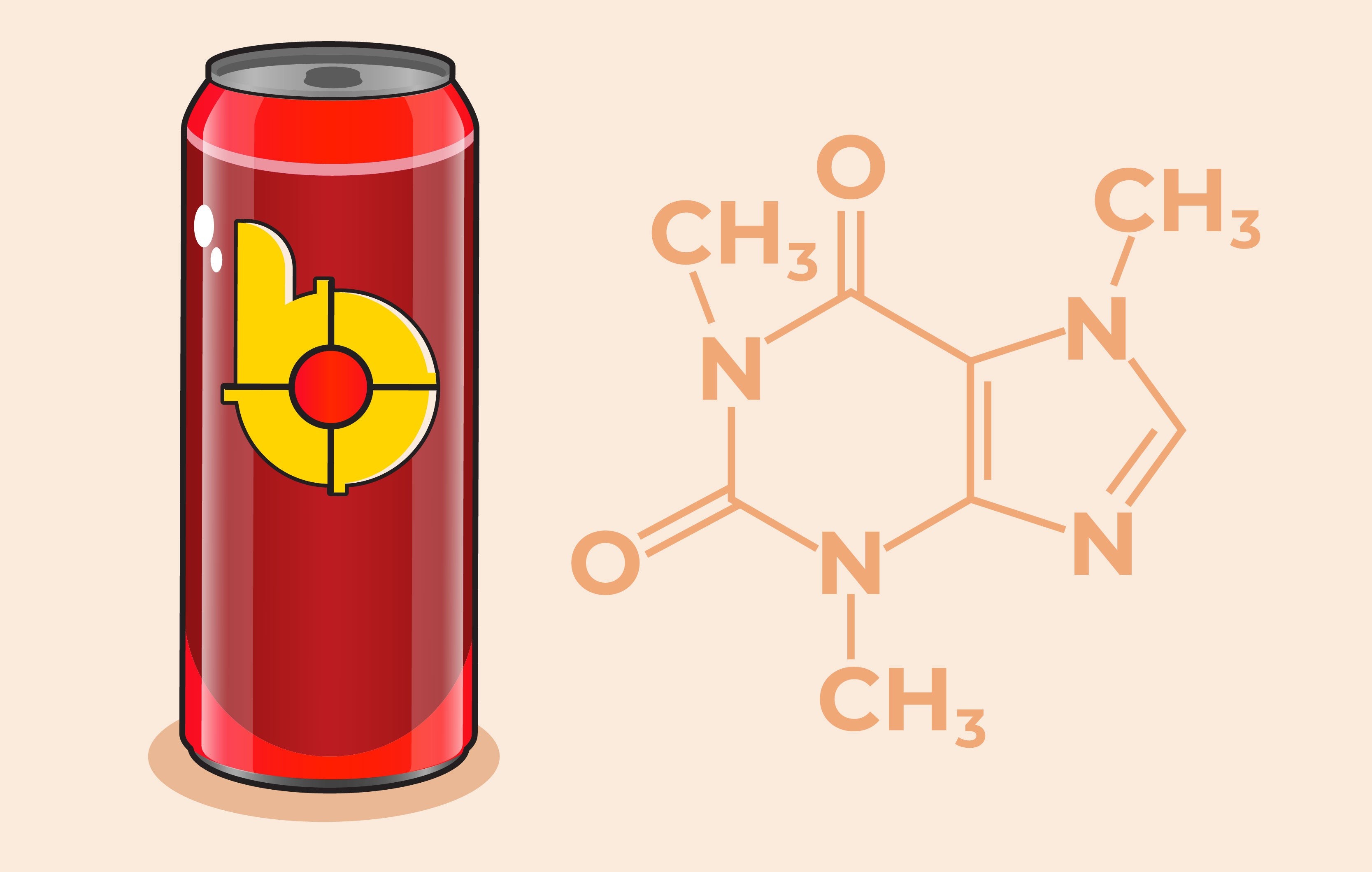Bang Energy drinks are a popular choice for a quick energy boost, but how much caffeine is in Bang Energy drinks and is it safe? Each can contains a substantial 300mg of caffeine. At HOW.EDU.VN, we’re here to provide expert insights into the caffeine content of Bang Energy, compare it to other beverages, and discuss the potential health implications. By understanding the caffeine levels, you can make informed decisions about incorporating Bang Energy into your lifestyle. Let’s delve into the specifics of caffeine concentration, health effects, and safer alternatives.
1. Understanding Caffeine Levels in Bang Energy Drinks
Energy drinks are marketed to enhance energy, physical performance, and mental alertness, primarily due to their high caffeine content [1]. Bang Energy drinks stand out because they contain significantly more caffeine compared to other caffeinated beverages. Each can packs 300 mg of caffeine, which is over three times the amount found in an average cup of coffee. This high concentration of caffeine can have pronounced effects on the body, both positive and negative, making it crucial to understand what you’re consuming.
Comparison Table of Caffeine Levels in Popular Caffeinated Beverages:
| Beverage | Caffeine Content (mg) |
|---|---|
| Bang Energy (16 fl oz) | 300 |
| Coffee (8 fl oz) | 95 |
| Red Bull (8.4 fl oz) | 80 |
| Monster Energy (16 fl oz) | 160 |
| Tea (8 fl oz) | 47 |
| Coca-Cola (12 fl oz) | 34 |



Anhydrous Caffeine: A Closer Look
Bang Energy drinks, like many other energy drinks, utilize anhydrous caffeine, a semi-synthetic form of the stimulant. Anhydrous caffeine is derived from the seeds and leaves of coffee plants, but it undergoes further refinement in a lab to produce a pure, highly concentrated form. This process removes water, resulting in a potent powder that delivers a quick and intense energy boost. A single teaspoon of this powder is equivalent to approximately 28 cups of coffee [3].
2. What Are the Health Implications of High Caffeine Consumption?
The Food and Drug Administration (FDA) suggests that most healthy adults can safely consume up to 400 mg of caffeine per day [4]. This amount is roughly equivalent to four or five cups of coffee, eight cups of tea, or two standard energy drinks. However, because a single can of Bang Energy contains 300 mg of caffeine, consuming more than one can per day could lead to adverse health effects. It is crucial to be aware of these potential risks to make informed choices about your caffeine consumption.
Potential Adverse Effects of High Caffeine Consumption:
- Anxiety or Nervousness: Caffeine can trigger the release of adrenaline, activating the body’s “fight-or-flight” response.
- Jitteriness: As a stimulant, excessive caffeine intake can cause physical agitation and tremors.
- Insomnia: Caffeine can make it difficult to fall asleep or cause you to wake up earlier than usual.
- Digestive Issues: Caffeine’s laxative properties can lead to diarrhea or vomiting.
- Addiction: Regular caffeine consumption can lead to psychological or physical dependence.
- High Blood Pressure: Caffeine stimulates the nervous system, potentially leading to elevated blood pressure.
- Heart Palpitations and Chest Pains: These symptoms, including an increased heart rate, are especially common among young people who consume energy drinks [5].
- Withdrawal Fatigue: As caffeine leaves the system, you may experience a “crash” characterized by fatigue and decreased energy levels.
- Frequent Urination: Caffeine is a diuretic, which means it can increase urine production and lead to more frequent trips to the bathroom.
- Headache, Dizziness, or Delirium: Caffeine can interfere with circulation and blood vessel movement in the brain, potentially causing these symptoms.
If you experience any of these symptoms after consuming a caffeinated beverage, it’s essential to seek medical attention promptly. Recognizing the signs of excessive caffeine intake is crucial for maintaining your health and well-being.
3. Who Should Avoid Bang Energy Drinks?
Bang Energy explicitly states that its products are not recommended for children, pregnant or nursing women, or individuals sensitive to caffeine. While many healthy adults can consume Bang Energy drinks in moderation without experiencing adverse effects, certain populations should avoid them altogether. This is due to the potential for caffeine to exacerbate existing health conditions or pose risks during sensitive periods like pregnancy.
Conditions That May Warrant Avoiding Bang Energy Drinks:
- Anxiety
- Bipolar disorder
- Bleeding disorders
- Heart conditions
- Diabetes
- Epilepsy
- Glaucoma
- High blood pressure
- Parkinson’s disease
- Schizophrenia
It’s also important to remember that everyone’s tolerance to caffeine varies. The FDA’s recommended daily intake is a general guideline, and individuals should never consume more caffeine than they can safely handle. Paying attention to your body’s signals and understanding your personal tolerance levels is key to responsible caffeine consumption.
4. The Tumultuous History of Bang Energy
Bang Energy drinks were introduced in 2012 and quickly rose to become the fourth-highest-selling energy drink brand in 2023. However, the company faced significant challenges when its CEO made unsubstantiated claims that the beverages could cure Alzheimer’s, Parkinson’s disease, and other neurological disorders. These claims led to legal battles and ultimately impacted the brand’s reputation.
Following a multimillion-dollar lawsuit from Monster Energy, Bang Energy declared bankruptcy in 2023 and was subsequently acquired by its competitor. The company previously offered a variety of products, including Bang Keto Coffee and Bang Natural, but these have since been discontinued. This shift in product offerings and the company’s financial struggles highlight the dynamic and often turbulent nature of the energy drink market.
5. What Do Users Really Think About Bang Energy Drinks?
Bang Energy drinks have garnered a significant following, with over 47 million cases sold in 2021. They have become particularly popular in the fitness industry and among those following a keto diet. However, consumer reviews of Bang Energy products are mixed. Social media conversations about Bang Energy experienced a sharp decline from 2023 to 2024, largely due to changing marketing trends and consumers’ increasing preference for healthier beverage options. Many individuals are wary of Bang’s high caffeine content and its potential health implications.
Rankings of the “most popular flavor” also vary widely, although Black Cherry Vanilla consistently ranks near the top. With a diverse range of flavors available, from Peach Mango to Rainbow Unicorn, Bang Energy offers a wide selection for those looking to try their products. However, potential consumers should carefully consider the caffeine content and their individual tolerance levels before indulging.
6. Exploring Alternatives to High-Caffeine Energy Drinks
If the high caffeine content of Bang Energy drinks concerns you, numerous lower-caffeine alternatives can provide a healthier energy boost. These alternatives offer a range of benefits, from natural caffeine sources to caffeine-free options that can help you stay energized without the potential drawbacks of high-caffeine energy drinks.
Healthier Alternatives to High-Caffeine Energy Drinks:
- Traditional Coffee: Options like Cafely OG SaiGon, a dark-roast coffee blend of arabica, robusta, and peaberry, provide a rich flavor and natural energy boost.
- Black Tea: Offers the benefits of caffeine without the high concentrations found in energy drinks, making it a moderate and enjoyable option.
- Kombucha: A fermented drink that delivers a gentle energy lift with B vitamins and a low caffeine content of only 10-15 mg per 8oz serving.
- Coconut Water: Loaded with electrolytes, coconut water quickly replenishes and boosts energy without any caffeine.
- Protein Shakes: Excellent post-workout beverages that replenish nutrients and provide a natural energy boost.
7. FAQs: Addressing Your Questions About Bang Energy and Caffeine
7.1. How much caffeine is in a Bang Energy drink compared to a cup of coffee?
A can of Bang Energy contains approximately three times as much caffeine as an average cup of coffee.
7.2. Is it safe to drink Bang Energy drinks every day?
While a single can of Bang Energy falls within the FDA’s recommended daily caffeine intake, daily consumption is not advised for everyone, particularly over extended periods.
7.3. Can Bang Energy drinks cause caffeine overdose?
Yes, consuming multiple cans in a short period, or even throughout a single day, can lead to a caffeine overdose.
7.4. Are there any caffeine-free versions of Bang?
No, all available Bang Energy drinks contain the same high amount of caffeine.
7.5. How does Bang’s high caffeine content affect workout performance?
Bang can increase alertness and energy levels, potentially enhancing workout intensity.
7.6. Is Bang suitable for children?
No, Bang Energy drinks are not recommended for children due to their high caffeine content.
7.7. Is Bang suitable for adults?
Bang Energy drinks are not recommended for pregnant or nursing women or those with caffeine sensitivity.
7.8. How does Bang’s caffeine content compare to other energy drinks?
Bang Energy drinks generally have a higher caffeine content than most other energy drinks on the market.
7.9. Can Bang Energy drinks help you lose weight?
While often marketed as a weight loss aid, energy drinks are often associated with poor weight loss behaviors and unhealthy body image [7].
7.10. What are some natural alternatives to Bang?
Natural coffee blends, like Cafely Sai Gon OG, have lower caffeine levels and are a healthier and more natural alternative to energy drinks.
At HOW.EDU.VN, our team of over 100 PhDs and experts is dedicated to providing you with reliable information and personalized guidance. Navigating the complexities of health and wellness can be challenging, and we’re here to offer tailored solutions for your unique needs.
Do you have more questions about caffeine, energy drinks, or other health-related topics? Contact us today for expert advice and customized support. We’re here to help you make informed decisions and achieve your wellness goals.
Address: 456 Expertise Plaza, Consult City, CA 90210, United States
WhatsApp: +1 (310) 555-1212
Website: how.edu.vn
References:
- U.S. Department of Health and Human Services. (n.d.). Energy drinks. National Center for Complementary and Integrative Health. https://www.nccih.nih.gov/health/energy-drinks
- Ribeiro, J. A., & Sebastião, A. M. (2010). Caffeine and adenosine. Journal of Alzheimer’s Disease: JAD, 20 Suppl 1(20), S3-15. https://doi.org/10.3233/JAD-2010-1379
- Commissioner, O. of the. (n.d.). Spilling the beans: How much caffeine is too much? U.S. Food and Drug Administration. https://www.fda.gov/consumers/consumer-updates/spilling-beans-how-much-caffeine-too-much
- USDA. (2020). Dietary Guidelines For Americans. Ninth Edition. https://www.dietaryguidelines.gov/sites/default/files/2020-12/Dietary_Guidelines_for_Americans_2020-2025.pdf
- A;, M. A. S. A. (n.d.). Energy drinks and atrial fibrillation in young adults. Clinical nutrition (Edinburgh, Scotland). https://pubmed.ncbi.nlm.nih.gov/28527645/
- Higgins, J. P., Tuttle, T. D., & Higgins, C. L. (2010, November). Energy beverages: Content and safety. Mayo Clinic proceedings. https://www.ncbi.nlm.nih.gov/pmc/articles/PMC2966367/
- EG;, J. A. H. K. (n.d.). Energy Drinks, weight loss, and disordered eating behaviors. Journal of American College Health : J of ACH. https://pubmed.ncbi.nlm.nih.gov/24635529/